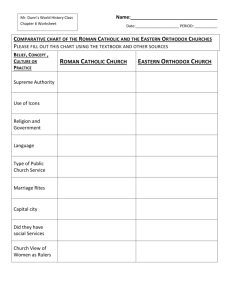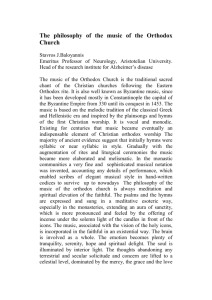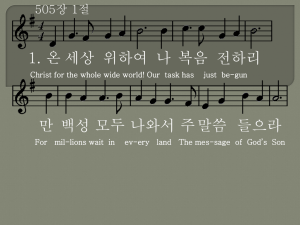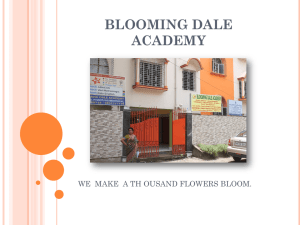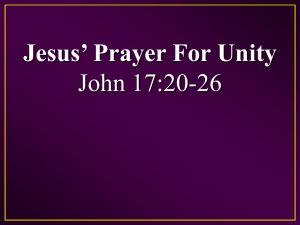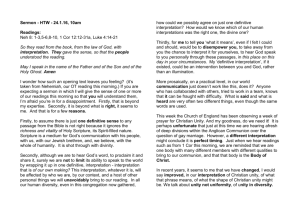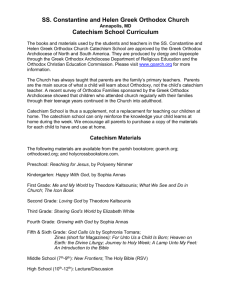Boundaries and Bridges - Holy Myrrhbearers Monastery
advertisement
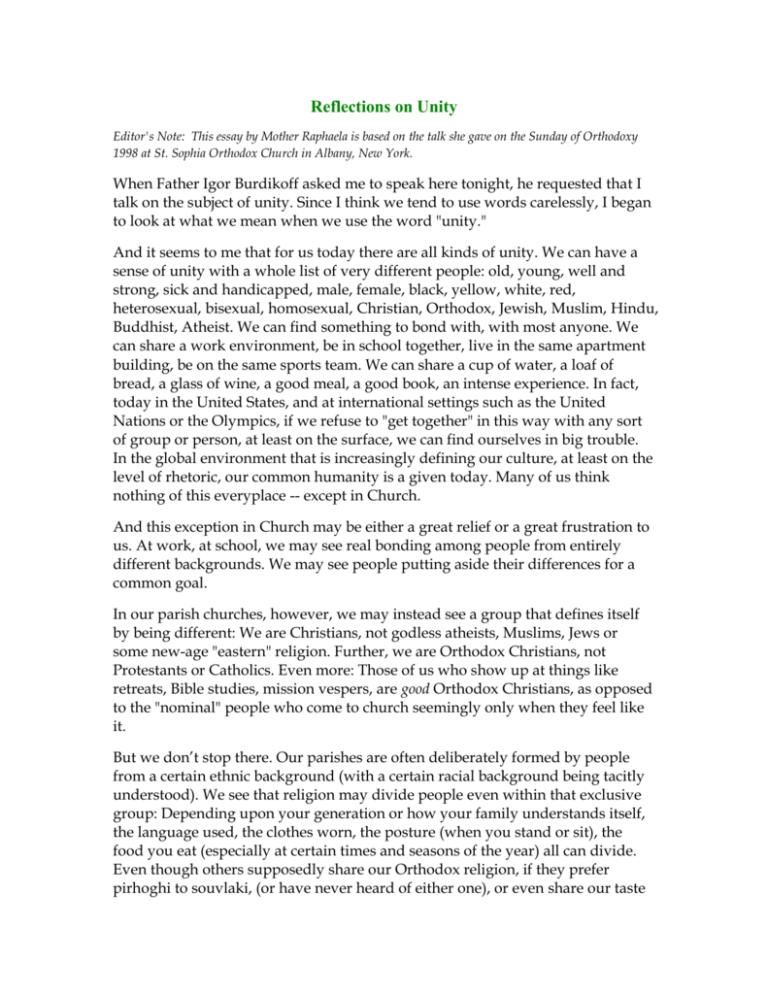
Reflections on Unity Editor's Note: This essay by Mother Raphaela is based on the talk she gave on the Sunday of Orthodoxy 1998 at St. Sophia Orthodox Church in Albany, New York. When Father Igor Burdikoff asked me to speak here tonight, he requested that I talk on the subject of unity. Since I think we tend to use words carelessly, I began to look at what we mean when we use the word "unity." And it seems to me that for us today there are all kinds of unity. We can have a sense of unity with a whole list of very different people: old, young, well and strong, sick and handicapped, male, female, black, yellow, white, red, heterosexual, bisexual, homosexual, Christian, Orthodox, Jewish, Muslim, Hindu, Buddhist, Atheist. We can find something to bond with, with most anyone. We can share a work environment, be in school together, live in the same apartment building, be on the same sports team. We can share a cup of water, a loaf of bread, a glass of wine, a good meal, a good book, an intense experience. In fact, today in the United States, and at international settings such as the United Nations or the Olympics, if we refuse to "get together" in this way with any sort of group or person, at least on the surface, we can find ourselves in big trouble. In the global environment that is increasingly defining our culture, at least on the level of rhetoric, our common humanity is a given today. Many of us think nothing of this everyplace -- except in Church. And this exception in Church may be either a great relief or a great frustration to us. At work, at school, we may see real bonding among people from entirely different backgrounds. We may see people putting aside their differences for a common goal. In our parish churches, however, we may instead see a group that defines itself by being different: We are Christians, not godless atheists, Muslims, Jews or some new-age "eastern" religion. Further, we are Orthodox Christians, not Protestants or Catholics. Even more: Those of us who show up at things like retreats, Bible studies, mission vespers, are good Orthodox Christians, as opposed to the "nominal" people who come to church seemingly only when they feel like it. But we don’t stop there. Our parishes are often deliberately formed by people from a certain ethnic background (with a certain racial background being tacitly understood). We see that religion may divide people even within that exclusive group: Depending upon your generation or how your family understands itself, the language used, the clothes worn, the posture (when you stand or sit), the food you eat (especially at certain times and seasons of the year) all can divide. Even though others supposedly share our Orthodox religion, if they prefer pirhoghi to souvlaki, (or have never heard of either one), or even share our taste for souvlaki or pirhoghi, but their accent indicates that they came from another side of the mountain, a different island, another tribal grouping, we know they will probably be more comfortable in another parish. I think all of this may be the reason we talk about evenings like this as "Pan Orthodox" gatherings. We find it easy to divide up our religion – to say there are many different Orthodoxies: Greek, Russian, Arab, Albanian, even (perhaps) American. I have trouble with this term, "Pan-Orthodox." Orthodoxy is one. The Faith of the Church is one. Our God is one. Jesus Christ is not divided. We may be pan-ethnic, but please God, if we are Orthodox at all, we are decidedly not pan-orthodox. We are called to find an even deeper unity in that Faith than our secular brethren can find in the world, no matter how different our ethnic or family or educational or cultural or economic or generational backgrounds may be. We should understand with our hearts, our souls and even our "guts" that we are One here tonight in Christ. Christ’s Unity -- the Unity of the Faith He gave us when He came to this earth as His Father’s Word spoken to us in the Flesh in order to die for us -- this is what we are here to celebrate, even while we may very rightly glory in the diversity of our pan-ethnic make-up. Orthodox Christian Unity is given. It is given in the Body of Jesus Christ, Crucified and Broken – we choose whether to enter into it or not. Our Church life, our personal lives, either are formed by Christ, or they witness to some other reality that will not make it into the Kingdom of Heaven: Pilate and Herod found unity – became friends -- by crucifying Christ. I’ve heard – and read – that people seem to think that was a good thing: Christ managed to reconcile enemies even at such a time. I think that is a very wrong interpretation. At compline each night at our monastery we sing from the prophecy of Isaiah: "The Lord shall destroy all who take counsel together." If, like Pilate and Herod, our agreement is our own, apart from God, it will lead only to our mutual destruction. All this means is that we will have company as we go to hell. So what are we to do to enter into the Unity of Christ? Should someone decree that at least here in America, OCA and Carpatho-Russian bishops serve only dioceses made up of people of Greek or Arab descent? Arab bishops lead the Russians? Convert bishops serve only cradle Orthodox and Greek bishops serve only converts? Perhaps 30% of the parishioners from every Greek parish should be bussed to an OCA parish every Sunday; 30% to an Antiochian parish and vice versa. Or simply mandate that every choir from every parish in a given area be on a travelling circuit, so everyone would get to hear some English, some Greek, some Ukrainian, some Slavonic, some Romanian, some Arabic… Legislation like this won’t work for us any better than it has worked for our country to heal the racial divisions or abolish crimes of hate, genocide, lust, passion and envy. There is no real unity outside of the Truth. There can be superficial bonding and fellowship, but only those who want the Kingdom of God -- those who are willing to die to their own human limitations and preferences and allow the universal love of Christ to triumph in their lives -- will find true Unity. And we need to realize that on this earth perfect Unity never has and never will exist. People are shocked to discover that there are divisions in the Church; that people in the church, including bishops and clergy, can sin. We need to be reminded that the Lord’s own hand-picked group of 12 disciples were not a bunch of sweet petunias. And when James, Barnabas and Paul were added to the mix there were hot arguments and serious divisions. Honest struggle and even fighting can be, as St. Paul says, the way to find the truth. Or they may simply witness to the fact that the devil seems to be working the hardest these days in the Church, tempting and attacking everyone from the smallest child screaming and climbing around in the pews up through the middle-aged person who will come to Church only if there is peace and quiet, the choir interested mainly in the sound of their voices, the burned-out priest who doesn’t want to deal with any bad news and the bishop who wonders why on earth he ever got into his position to begin with. We do need to remember that if our Church organization was formed by the teaching of the Apostles and Fathers, such a term as Pan Orthodox wouldn’t even exist. There would be no such thing as more than one bishop in one city; no parishes identified as anything other than the local Orthodox Church; the local Body of Christ. Period. So what do we do? What can we do? How hard it is to accept the fact that we cannot save God’s Church. God, through His Church, saves us. All our committees, our workshops, our plans, will not and cannot achieve anything, as long as we think that we are the ones in charge. A friend of mine often says that it is a form of insanity to keep doing the same thing and expect to get different results. We need to change, which is another word for the Lord’s first Gospel command to each one of us: "Repent." I cannot change anyone else, so here I will speak of what I know I need to do. I need to take time each and every day to remember deliberately and consciously that I am in the presence of God whether or not I am aware of Him (or even, as has been true at times in my life, whether or not I feel I believe in Him). I need to try to turn myself away from my own ideas, opinions, ways of doing things, at least for a few minutes every day in His presence, and ask Him to give me His thoughts; His ways. I need to admit to myself before Him that I am not perfect; that at least at times I am making a mess of my personal life and my public life and that I need His help. I need to bring before Him very deliberately all the people who are part of my life and to put aside my thoughts about them so I don’t waste time telling Him what He already knows I think about them. Rather I need to let go of others, remembering that He is their God and they themselves stand, as I do, before Him. I think we all need to pray in this way. I need to pray for myself, for every sister in my monastery, for every member of my family, for those who work with me, for those who love me and for those who hate me. All of you need to pray for yourselves, for every person in your parish church, for your priest; your bishop. We need to pray for other parishes, priests and bishops as well. I believe our bishops and priests need to pray in this way for themselves, their people and their parishes. To learn to pray in this way; to learn to turn our lives and our churches over to God so that He can act, is probably the most difficult thing for Orthodox Christians to do in these days. We behave like functional atheists. We say we believe in God, but our actions show otherwise. We do not believe that He is the most important and most powerful Person in our lives and in the Church. If this is true, we are heretics at best, not Orthodox Christians, and we need to ask ourselves why we bother to come to Church. How many times have I heard Orthodox say: "I’m in Church because my Baba (or my Yaya) was on her knees every day, praying for me." Frequently they then go on to mention that their children and grandchildren no longer come to Church. When I ask them if they get on their knees every day to pray for them, they often reply that no, that is not something they do; that is something their grandparents "used to do." This is one of the reasons I think many of us today need remedial help to learn to pray. Last Sunday I was at Holy Transfiguration Cathedral in Brooklyn, and at the brunch following the Liturgy, pieces of paper were passed around for us each to write our own name. All the pieces of paper were put in a bag, mixed up and passed around again. We each pulled the name of someone else present whom we are to pray for each day through the whole of Great Lent, without their knowing it. At Pascha, we are each to tell our "Prayer Partner" who we are, greet them with the Paschal greeting and give him or her a red egg. We were also given a small card with a beautiful prayer to say each day for that person. I think such a thing today can be a wonderful teaching custom for those who haven’t taken the first steps in learning to pray for others. When we are children in the faith, it is best to admit it and begin where we are. As we do this; as we become praying members of the Body of Christ and through prayer give God even a tiny little space to enter into our lives and into the lives of our parishes, He can and will work wonders. Changes will take place. Even here on this earth, there will be moments when men and women will have a real experience of His unity and peace which surpass all our understanding. But as long as we insist on calling the parish we attend "Our Church," it will remain just that. We will be divided. Only God’s Church, the Church of Christ, is One. Talk given at Sunday of Orthodoxy Vespers, 1999 at St. Sophia Greek Orthodox Church, Albany, New York, by Mother Raphaela, Abbess, Holy Myrrhbearers Monastery, Otego, New York
